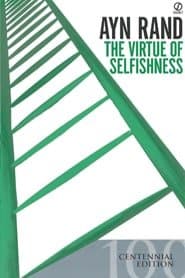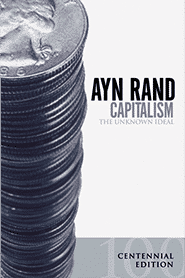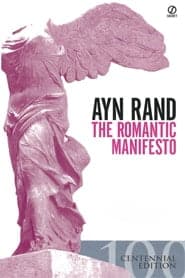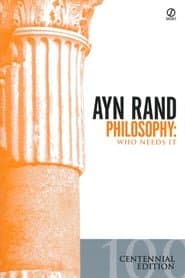ONLINE READING GROUP
The Virtue of Selfishness
November 4 — December 23
Saturdays at
2:00-3:45pm ET
Required Readings
Atlas Shrugged &
The Fountainhead
Steven Warden,
ARI Junior Fellow
- Most ethical discussions take for granted the supreme moral value of selfless service. In this volume’s lead essay, “The Objectivist Ethics,” Ayn Rand challenges that basic assumption by reconsidering ethics from the ground up. Why, she asks, does man need morality in the first place? Her answer to that question culminates in the definition of a new code of morality, based in rational self-interest, aimed at each individual’s life and happiness, and rejecting sacrifice as immoral.
- In subsequent articles, Rand expands her theory and discusses practical questions such as: Do people face intractable conflicts of interest? Isn’t everyone selfish? Doesn’t life require compromise? How do I live in an irrational society? What about the needs of others? What are political rights? What’s the rational function of government? Her fresh, provocative answers cast new light on what it means to be genuinely selfish.
- Reading group participants are expected to meet weekly via Zoom, with occasional breaks for holidays and ARI events. We understand that participants may need to miss a few meetings. This is perfectly alright, but we encourage you to sign up only if you will be able to attend 4+ meetings, arrive prepared, and actively participate. Some reading groups also have optional weekly assignments (‘optional’ meaning not required, but highly encouraged to ensure quality discussions).
- If you want to participate but are unable to fulfill these participation standards due to special circumstances, please feel free to contact us at readinggroups@aynrand.org.
- Upon sign-up, you will receive a reading schedule with meeting times and a Zoom link, an introductory letter from the discussion leader, and a link to request a free e-book from ARI so that you can access the reading materials.
- Discussions are led by members of ARI’s junior faculty. Their role is to direct participants’ attention to important passages within the readings, ask questions to stimulate discussion, and occasionally chime in with corrections or thoughts about the book’s content. That said, an ideal discussion from our perspective is one in which the participants drive the discussion and respond to each other! The junior faculty are happy to answer questions, and the final meeting will be a Q&A with a member of ARI’s senior faculty—experts on Rand’s life and philosophy.
ONLINE READING GROUP
Capitalism: The Unknown Ideal
November 5 — January 14
Sundays at
12:00-1:45pm ET
Required Readings
Atlas Shrugged &
The Fountainhead
Sam Weaver,
ARI Junior Fellow
- “The method of capitalism’s destruction,” Ayn Rand writes, “rests on never letting the world discover what it is that is being destroyed.” In Capitalism: The Unknown Ideal, Rand and her colleagues define a new view of capitalism’s meaning, history, and philosophic basis and set out to demolish many of the myths surrounding capitalism.
- Does capitalism lead to depressions, monopolies, child labor or war? Why is big business so hated? Is religion compatible with capitalism? Is government regulation the solution to economic problems or their cause? What is freedom and what kind of government does it require? Is capitalism moral?
- Capitalism: The Unknown Ideal tackles these and other timeless questions about capitalism, and lays out Rand’s provocative thesis: that the system of laissez-faire capitalism is a moral ideal. This book is not a treatise on the economics of capitalism, but a collection of essays on the philosophy of capitalism: the basic truths and principles that make capitalism the only moral and practical social system — the only system consistent with man’s nature and the requirements of his life — the only one that enables each individual to reach his full, glorious potential.
- Reading group participants are expected to meet weekly via Zoom, with occasional breaks for holidays and ARI events. We understand that participants may need to miss a few meetings. This is perfectly alright, but we encourage you to sign up only if you will be able to attend 4+ meetings, arrive prepared, and actively participate. Some reading groups also have optional weekly assignments (‘optional’ meaning not required, but highly encouraged to ensure quality discussions).
- If you want to participate but are unable to fulfill these participation standards due to special circumstances, please feel free to contact us at readinggroups@aynrand.org.
- Upon sign-up, you will receive a reading schedule with meeting times and a Zoom link, an introductory letter from the discussion leader, and a link to request a free e-book from ARI so that you can access the reading materials.
- Discussions are led by members of ARI’s junior faculty. Their role is to direct participants’ attention to important passages within the readings, ask questions to stimulate discussion, and occasionally chime in with corrections or thoughts about the book’s content. That said, an ideal discussion from our perspective is one in which the participants drive the discussion and respond to each other! The junior faculty are happy to answer questions, and the final meeting will be a Q&A with a member of ARI’s senior faculty—experts on Rand’s life and philosophy.
ONLINE READING GROUP
The Romantic Manifesto
November 6 — January 8
Mondays at
2:00-3:45pm ET
Required Readings
Atlas Shrugged &
The Fountainhead
Tristan de Liege,
ARI Junior Fellow
- Ayn Rand, born in St. Petersburg in 1905, recalls growing up in “the last afterglow of the most radiant cultural atmosphere in human history (achieved not by Russian, but by Western culture).” It was an era of literary giants such as Victor Hugo, Friedrich Schiller and Edmond Rostand, when “art projected an overwhelming sense of intellectual freedom, of depth, i.e., concern with fundamental problems, of demanding standards, of inexhaustible originality, of unlimited possibilities, and, above all, of profound respect for man.”
- That atmosphere’s evaporation in the twentieth century — not only from neglect but through nihilistic movements in all of art’s branches — helped inspire Rand to elucidate her own esthetic theory and campaign for an esthetic renaissance. In these essays, she argues that art is not a luxury but a critical need — not a material need, but a need of man’s rational mind, on which his material survival depends.
- Reading group participants are expected to meet weekly via Zoom, with occasional breaks for holidays and ARI events. We understand that participants may need to miss a few meetings. This is perfectly alright, but we encourage you to sign up only if you will be able to attend 4+ meetings, arrive prepared, and actively participate. Some reading groups also have optional weekly assignments (‘optional’ meaning not required, but highly encouraged to ensure quality discussions).
- If you want to participate but are unable to fulfill these participation standards due to special circumstances, please feel free to contact us at readinggroups@aynrand.org.
- Upon sign-up, you will receive a reading schedule with meeting times and a Zoom link, an introductory letter from the discussion leader, and a link to request a free e-book from ARI so that you can access the reading materials.
- Discussions are led by members of ARI’s junior faculty. Their role is to direct participants’ attention to important passages within the readings, ask questions to stimulate discussion, and occasionally chime in with corrections or thoughts about the book’s content. That said, an ideal discussion from our perspective is one in which the participants drive the discussion and respond to each other! The junior faculty are happy to answer questions, and the final meeting will be a Q&A with a member of ARI’s senior faculty—experts on Rand’s life and philosophy.
ONLINE READING GROUP
Philosophy: Who Needs It
November 7 — January 16
Tuesdays at
12:30-2:15pm ET
Required Readings
Atlas Shrugged &
The Fountainhead
Ziemowit Gowin,
ARI Junior Fellow
- Philosophy: Who Needs It is a collection of eighteen essays written by Ayn Rand in the years following Atlas Shrugged. In it, she argues that philosophy is not a pastime for brooding teenagers or ivory tower intellectuals. It’s a subject that deals with some of the most important issues in human life. Contrary to the notion that philosophy is detached from the practical concerns of life, Rand sees philosophy’s influence everywhere and argues that abstract ideas have profound real-life consequences.
- Join our Philosophy: Who Needs It reading group to learn why Rand’s answer to the question of who needs philosophy is an emphatic: you do!
- Reading group participants are expected to meet weekly via Zoom, with occasional breaks for holidays and ARI events. We understand that participants may need to miss a few meetings. This is perfectly alright, but we encourage you to sign up only if you will be able to attend 4+ meetings, arrive prepared, and actively participate. Some reading groups also have optional weekly assignments (‘optional’ meaning not required, but highly encouraged to ensure quality discussions).
- If you want to participate but are unable to fulfill these participation standards due to special circumstances, please feel free to contact us at readinggroups@aynrand.org.
- Upon sign-up, you will receive a reading schedule with meeting times and a Zoom link, an introductory letter from the discussion leader, and a link to request a free e-book from ARI so that you can access the reading materials.
- Discussions are led by members of ARI’s junior faculty. Their role is to direct participants’ attention to important passages within the readings, ask questions to stimulate discussion, and occasionally chime in with corrections or thoughts about the book’s content. That said, an ideal discussion from our perspective is one in which the participants drive the discussion and respond to each other! The junior faculty are happy to answer questions, and the final meeting will be a Q&A with a member of ARI’s senior faculty—experts on Rand’s life and philosophy.
ONLINE READING GROUP
The Virtue of Selfishness
November 8 — December 27
Wednesdays at
9:00-10:45am ET
Required Readings
Atlas Shrugged &
The Fountainhead
ARI Junior Fellow,
Reinier Schuur
- Most ethical discussions take for granted the supreme moral value of selfless service. In this volume’s lead essay, “The Objectivist Ethics,” Ayn Rand challenges that basic assumption by reconsidering ethics from the ground up. Why, she asks, does man need morality in the first place? Her answer to that question culminates in the definition of a new code of morality, based in rational self-interest, aimed at each individual’s life and happiness, and rejecting sacrifice as immoral.
- In subsequent articles, Rand expands her theory and discusses practical questions such as: Do people face intractable conflicts of interest? Isn’t everyone selfish? Doesn’t life require compromise? How do I live in an irrational society? What about the needs of others? What are political rights? What’s the rational function of government? Her fresh, provocative answers cast new light on what it means to be genuinely selfish.
- Reading group participants are expected to meet weekly via Zoom, with occasional breaks for holidays and ARI events. We understand that participants may need to miss a few meetings. This is perfectly alright, but we encourage you to sign up only if you will be able to attend 4+ meetings, arrive prepared, and actively participate. Some reading groups also have optional weekly assignments (‘optional’ meaning not required, but highly encouraged to ensure quality discussions).
- If you want to participate but are unable to fulfill these participation standards due to special circumstances, please feel free to contact us at readinggroups@aynrand.org.
- Upon sign-up, you will receive a reading schedule with meeting times and a Zoom link, an introductory letter from the discussion leader, and a link to request a free e-book from ARI so that you can access the reading materials.
- Discussions are led by members of ARI’s junior faculty. Their role is to direct participants’ attention to important passages within the readings, ask questions to stimulate discussion, and occasionally chime in with corrections or thoughts about the book’s content. That said, an ideal discussion from our perspective is one in which the participants drive the discussion and respond to each other! The junior faculty are happy to answer questions, and the final meeting will be a Q&A with a member of ARI’s senior faculty—experts on Rand’s life and philosophy.



